Entrepreneurship & Small Business Management: Ventures & Impact on UK
VerifiedAdded on 2020/10/05
|12
|3030
|295
Report
AI Summary
This report provides a comprehensive analysis of entrepreneurship and small business management, focusing on various types of entrepreneurial ventures, their similarities and differences, and their impact on the UK economy. It examines the role of micro and small businesses in the growth of the social economy, highlighting their contribution to employment and community development. The report also delves into the traits and skills of successful entrepreneurs, using Alan Michael Sugar as a case study to illustrate entrepreneurial personality, motivation, and mindset. Furthermore, it discusses how background and experience can either hinder or foster entrepreneurship, providing a holistic view of the entrepreneurial landscape. Desklib offers this report as a valuable resource for students and researchers seeking to understand the dynamics of entrepreneurship and small business management.

Entrepreneurship and Small
Business Management
Business Management
Paraphrase This Document
Need a fresh take? Get an instant paraphrase of this document with our AI Paraphraser
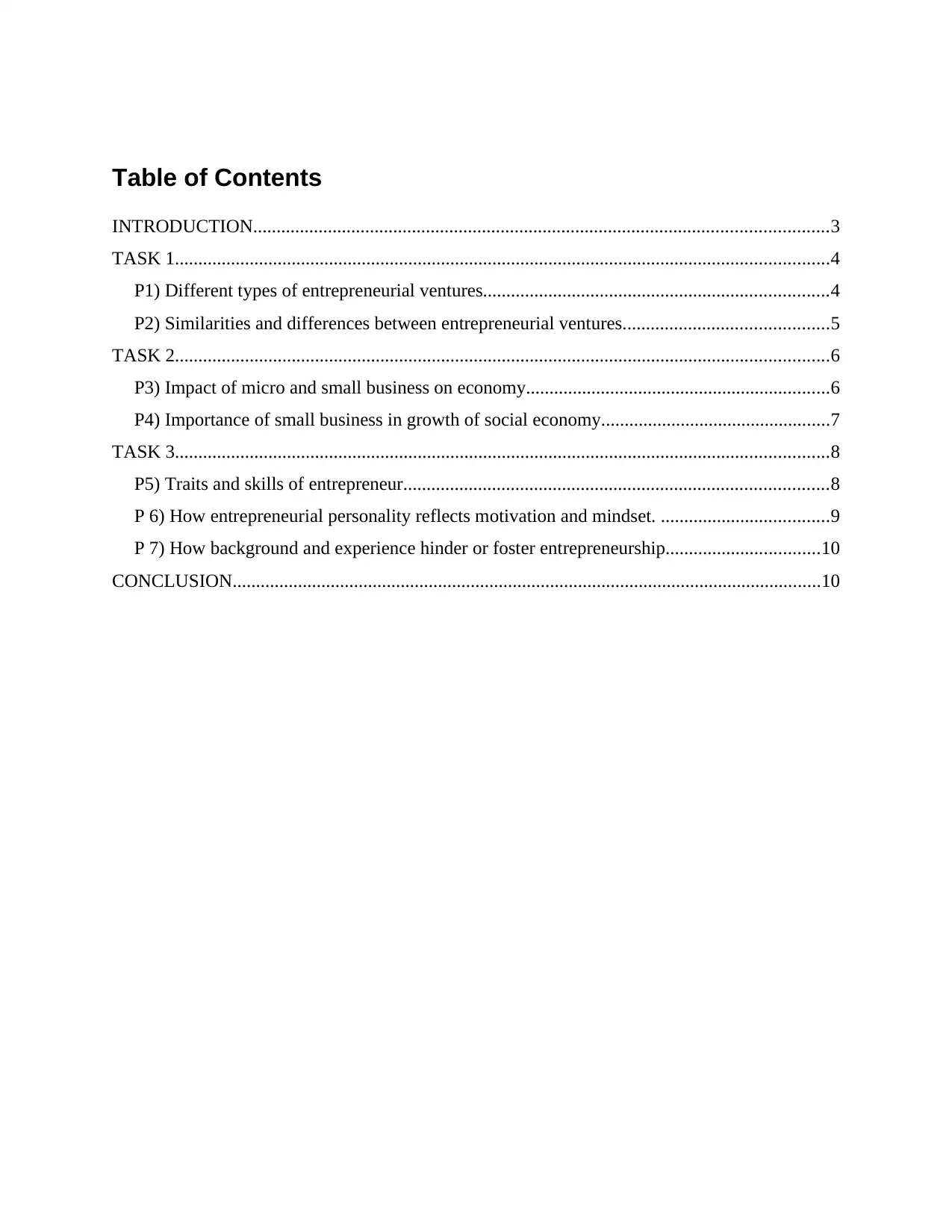
Table of Contents
INTRODUCTION...........................................................................................................................3
TASK 1............................................................................................................................................4
P1) Different types of entrepreneurial ventures..........................................................................4
P2) Similarities and differences between entrepreneurial ventures............................................5
TASK 2............................................................................................................................................6
P3) Impact of micro and small business on economy.................................................................6
P4) Importance of small business in growth of social economy.................................................7
TASK 3............................................................................................................................................8
P5) Traits and skills of entrepreneur...........................................................................................8
P 6) How entrepreneurial personality reflects motivation and mindset. ....................................9
P 7) How background and experience hinder or foster entrepreneurship.................................10
CONCLUSION..............................................................................................................................10
INTRODUCTION...........................................................................................................................3
TASK 1............................................................................................................................................4
P1) Different types of entrepreneurial ventures..........................................................................4
P2) Similarities and differences between entrepreneurial ventures............................................5
TASK 2............................................................................................................................................6
P3) Impact of micro and small business on economy.................................................................6
P4) Importance of small business in growth of social economy.................................................7
TASK 3............................................................................................................................................8
P5) Traits and skills of entrepreneur...........................................................................................8
P 6) How entrepreneurial personality reflects motivation and mindset. ....................................9
P 7) How background and experience hinder or foster entrepreneurship.................................10
CONCLUSION..............................................................................................................................10
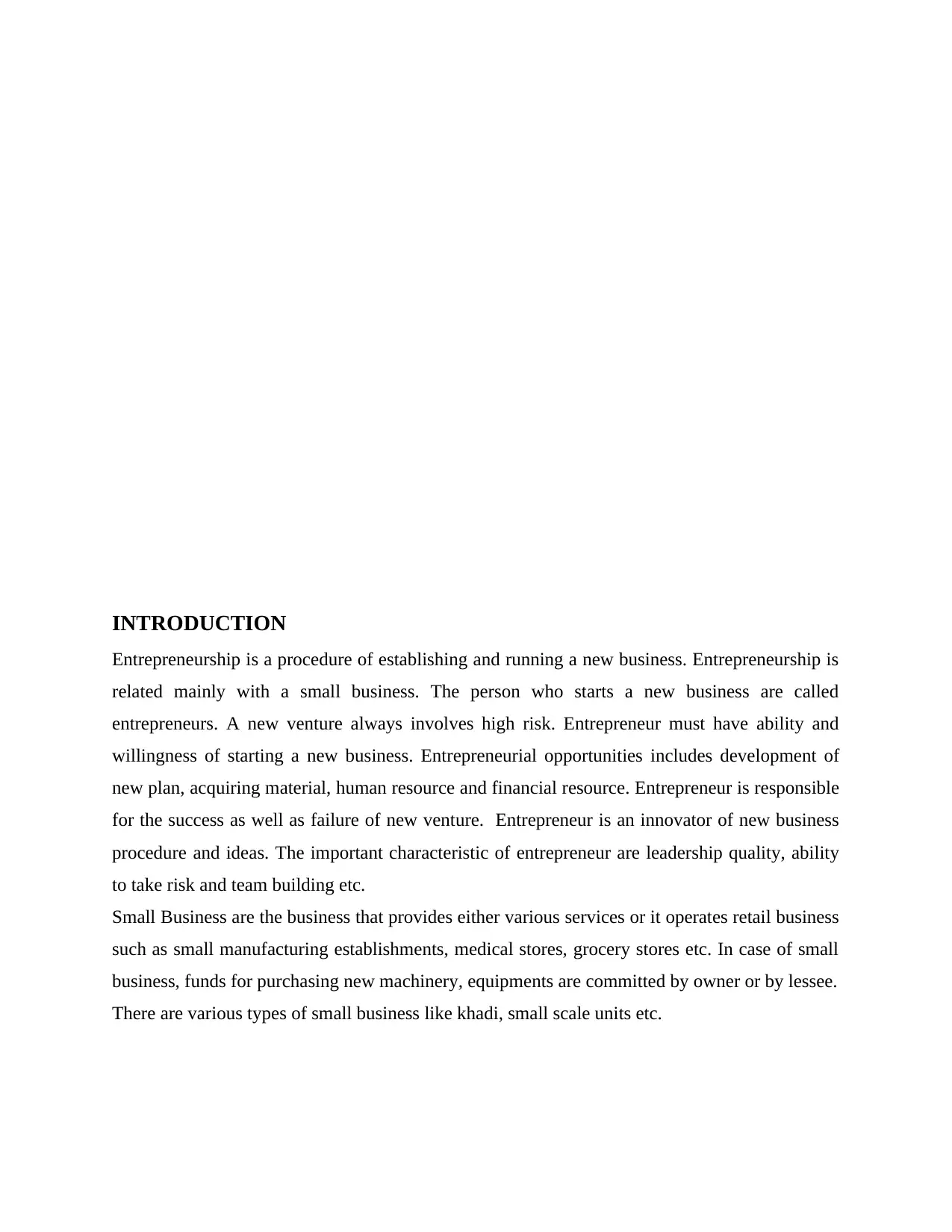
INTRODUCTION
Entrepreneurship is a procedure of establishing and running a new business. Entrepreneurship is
related mainly with a small business. The person who starts a new business are called
entrepreneurs. A new venture always involves high risk. Entrepreneur must have ability and
willingness of starting a new business. Entrepreneurial opportunities includes development of
new plan, acquiring material, human resource and financial resource. Entrepreneur is responsible
for the success as well as failure of new venture. Entrepreneur is an innovator of new business
procedure and ideas. The important characteristic of entrepreneur are leadership quality, ability
to take risk and team building etc.
Small Business are the business that provides either various services or it operates retail business
such as small manufacturing establishments, medical stores, grocery stores etc. In case of small
business, funds for purchasing new machinery, equipments are committed by owner or by lessee.
There are various types of small business like khadi, small scale units etc.
Entrepreneurship is a procedure of establishing and running a new business. Entrepreneurship is
related mainly with a small business. The person who starts a new business are called
entrepreneurs. A new venture always involves high risk. Entrepreneur must have ability and
willingness of starting a new business. Entrepreneurial opportunities includes development of
new plan, acquiring material, human resource and financial resource. Entrepreneur is responsible
for the success as well as failure of new venture. Entrepreneur is an innovator of new business
procedure and ideas. The important characteristic of entrepreneur are leadership quality, ability
to take risk and team building etc.
Small Business are the business that provides either various services or it operates retail business
such as small manufacturing establishments, medical stores, grocery stores etc. In case of small
business, funds for purchasing new machinery, equipments are committed by owner or by lessee.
There are various types of small business like khadi, small scale units etc.
⊘ This is a preview!⊘
Do you want full access?
Subscribe today to unlock all pages.

Trusted by 1+ million students worldwide
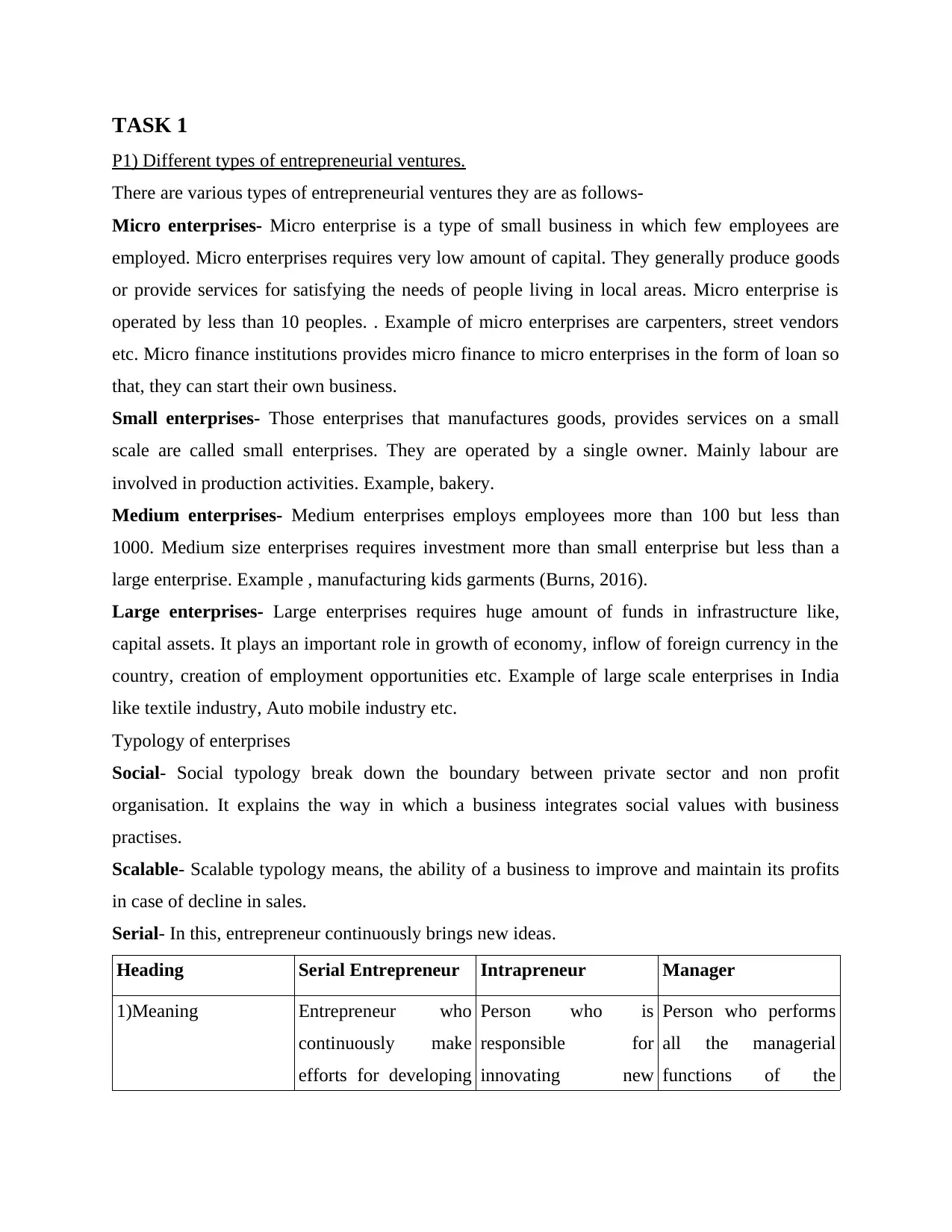
TASK 1
P1) Different types of entrepreneurial ventures.
There are various types of entrepreneurial ventures they are as follows-
Micro enterprises- Micro enterprise is a type of small business in which few employees are
employed. Micro enterprises requires very low amount of capital. They generally produce goods
or provide services for satisfying the needs of people living in local areas. Micro enterprise is
operated by less than 10 peoples. . Example of micro enterprises are carpenters, street vendors
etc. Micro finance institutions provides micro finance to micro enterprises in the form of loan so
that, they can start their own business.
Small enterprises- Those enterprises that manufactures goods, provides services on a small
scale are called small enterprises. They are operated by a single owner. Mainly labour are
involved in production activities. Example, bakery.
Medium enterprises- Medium enterprises employs employees more than 100 but less than
1000. Medium size enterprises requires investment more than small enterprise but less than a
large enterprise. Example , manufacturing kids garments (Burns, 2016).
Large enterprises- Large enterprises requires huge amount of funds in infrastructure like,
capital assets. It plays an important role in growth of economy, inflow of foreign currency in the
country, creation of employment opportunities etc. Example of large scale enterprises in India
like textile industry, Auto mobile industry etc.
Typology of enterprises
Social- Social typology break down the boundary between private sector and non profit
organisation. It explains the way in which a business integrates social values with business
practises.
Scalable- Scalable typology means, the ability of a business to improve and maintain its profits
in case of decline in sales.
Serial- In this, entrepreneur continuously brings new ideas.
Heading Serial Entrepreneur Intrapreneur Manager
1)Meaning Entrepreneur who
continuously make
efforts for developing
Person who is
responsible for
innovating new
Person who performs
all the managerial
functions of the
P1) Different types of entrepreneurial ventures.
There are various types of entrepreneurial ventures they are as follows-
Micro enterprises- Micro enterprise is a type of small business in which few employees are
employed. Micro enterprises requires very low amount of capital. They generally produce goods
or provide services for satisfying the needs of people living in local areas. Micro enterprise is
operated by less than 10 peoples. . Example of micro enterprises are carpenters, street vendors
etc. Micro finance institutions provides micro finance to micro enterprises in the form of loan so
that, they can start their own business.
Small enterprises- Those enterprises that manufactures goods, provides services on a small
scale are called small enterprises. They are operated by a single owner. Mainly labour are
involved in production activities. Example, bakery.
Medium enterprises- Medium enterprises employs employees more than 100 but less than
1000. Medium size enterprises requires investment more than small enterprise but less than a
large enterprise. Example , manufacturing kids garments (Burns, 2016).
Large enterprises- Large enterprises requires huge amount of funds in infrastructure like,
capital assets. It plays an important role in growth of economy, inflow of foreign currency in the
country, creation of employment opportunities etc. Example of large scale enterprises in India
like textile industry, Auto mobile industry etc.
Typology of enterprises
Social- Social typology break down the boundary between private sector and non profit
organisation. It explains the way in which a business integrates social values with business
practises.
Scalable- Scalable typology means, the ability of a business to improve and maintain its profits
in case of decline in sales.
Serial- In this, entrepreneur continuously brings new ideas.
Heading Serial Entrepreneur Intrapreneur Manager
1)Meaning Entrepreneur who
continuously make
efforts for developing
Person who is
responsible for
innovating new
Person who performs
all the managerial
functions of the
Paraphrase This Document
Need a fresh take? Get an instant paraphrase of this document with our AI Paraphraser
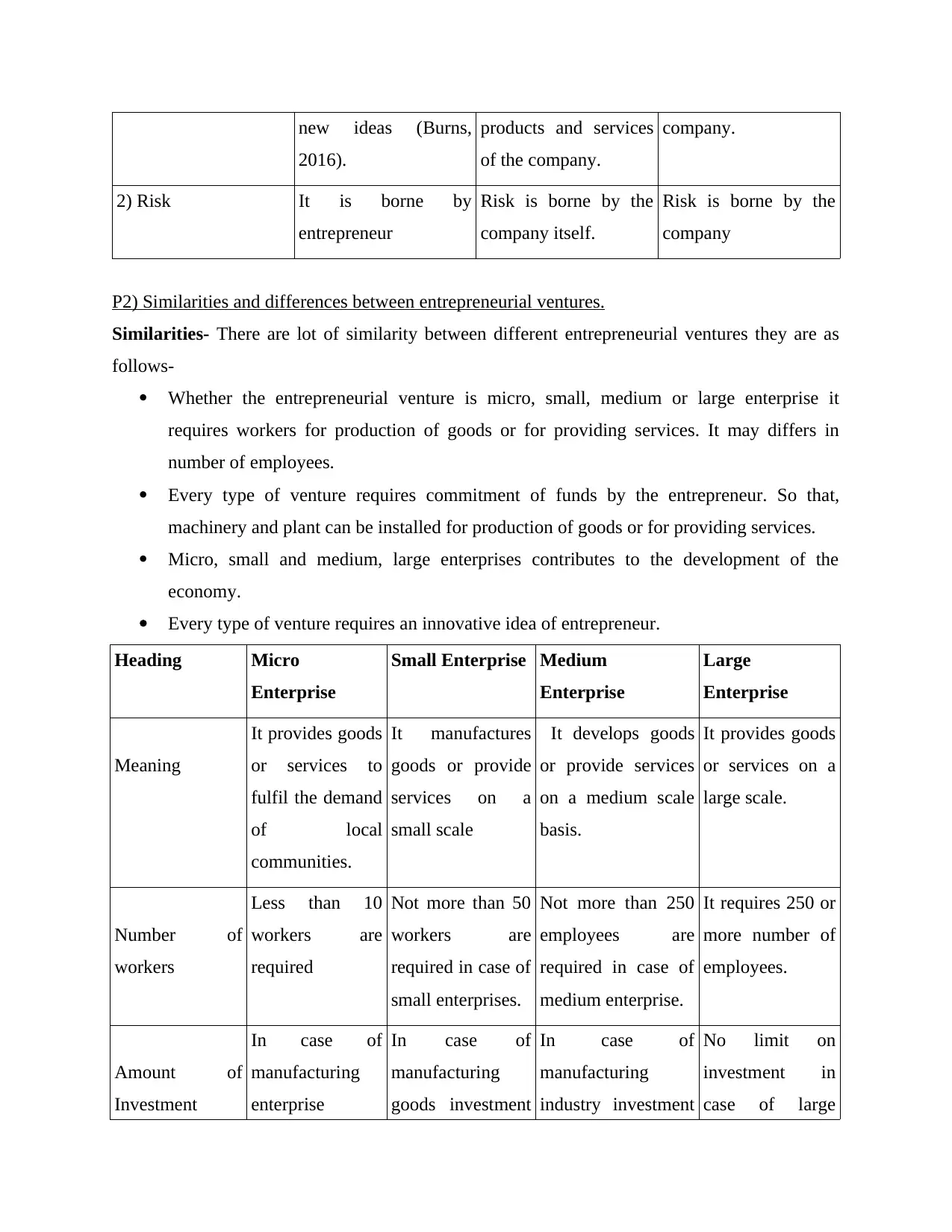
new ideas (Burns,
2016).
products and services
of the company.
company.
2) Risk It is borne by
entrepreneur
Risk is borne by the
company itself.
Risk is borne by the
company
P2) Similarities and differences between entrepreneurial ventures.
Similarities- There are lot of similarity between different entrepreneurial ventures they are as
follows-
Whether the entrepreneurial venture is micro, small, medium or large enterprise it
requires workers for production of goods or for providing services. It may differs in
number of employees.
Every type of venture requires commitment of funds by the entrepreneur. So that,
machinery and plant can be installed for production of goods or for providing services.
Micro, small and medium, large enterprises contributes to the development of the
economy.
Every type of venture requires an innovative idea of entrepreneur.
Heading Micro
Enterprise
Small Enterprise Medium
Enterprise
Large
Enterprise
Meaning
It provides goods
or services to
fulfil the demand
of local
communities.
It manufactures
goods or provide
services on a
small scale
It develops goods
or provide services
on a medium scale
basis.
It provides goods
or services on a
large scale.
Number of
workers
Less than 10
workers are
required
Not more than 50
workers are
required in case of
small enterprises.
Not more than 250
employees are
required in case of
medium enterprise.
It requires 250 or
more number of
employees.
Amount of
Investment
In case of
manufacturing
enterprise
In case of
manufacturing
goods investment
In case of
manufacturing
industry investment
No limit on
investment in
case of large
2016).
products and services
of the company.
company.
2) Risk It is borne by
entrepreneur
Risk is borne by the
company itself.
Risk is borne by the
company
P2) Similarities and differences between entrepreneurial ventures.
Similarities- There are lot of similarity between different entrepreneurial ventures they are as
follows-
Whether the entrepreneurial venture is micro, small, medium or large enterprise it
requires workers for production of goods or for providing services. It may differs in
number of employees.
Every type of venture requires commitment of funds by the entrepreneur. So that,
machinery and plant can be installed for production of goods or for providing services.
Micro, small and medium, large enterprises contributes to the development of the
economy.
Every type of venture requires an innovative idea of entrepreneur.
Heading Micro
Enterprise
Small Enterprise Medium
Enterprise
Large
Enterprise
Meaning
It provides goods
or services to
fulfil the demand
of local
communities.
It manufactures
goods or provide
services on a
small scale
It develops goods
or provide services
on a medium scale
basis.
It provides goods
or services on a
large scale.
Number of
workers
Less than 10
workers are
required
Not more than 50
workers are
required in case of
small enterprises.
Not more than 250
employees are
required in case of
medium enterprise.
It requires 250 or
more number of
employees.
Amount of
Investment
In case of
manufacturing
enterprise
In case of
manufacturing
goods investment
In case of
manufacturing
industry investment
No limit on
investment in
case of large
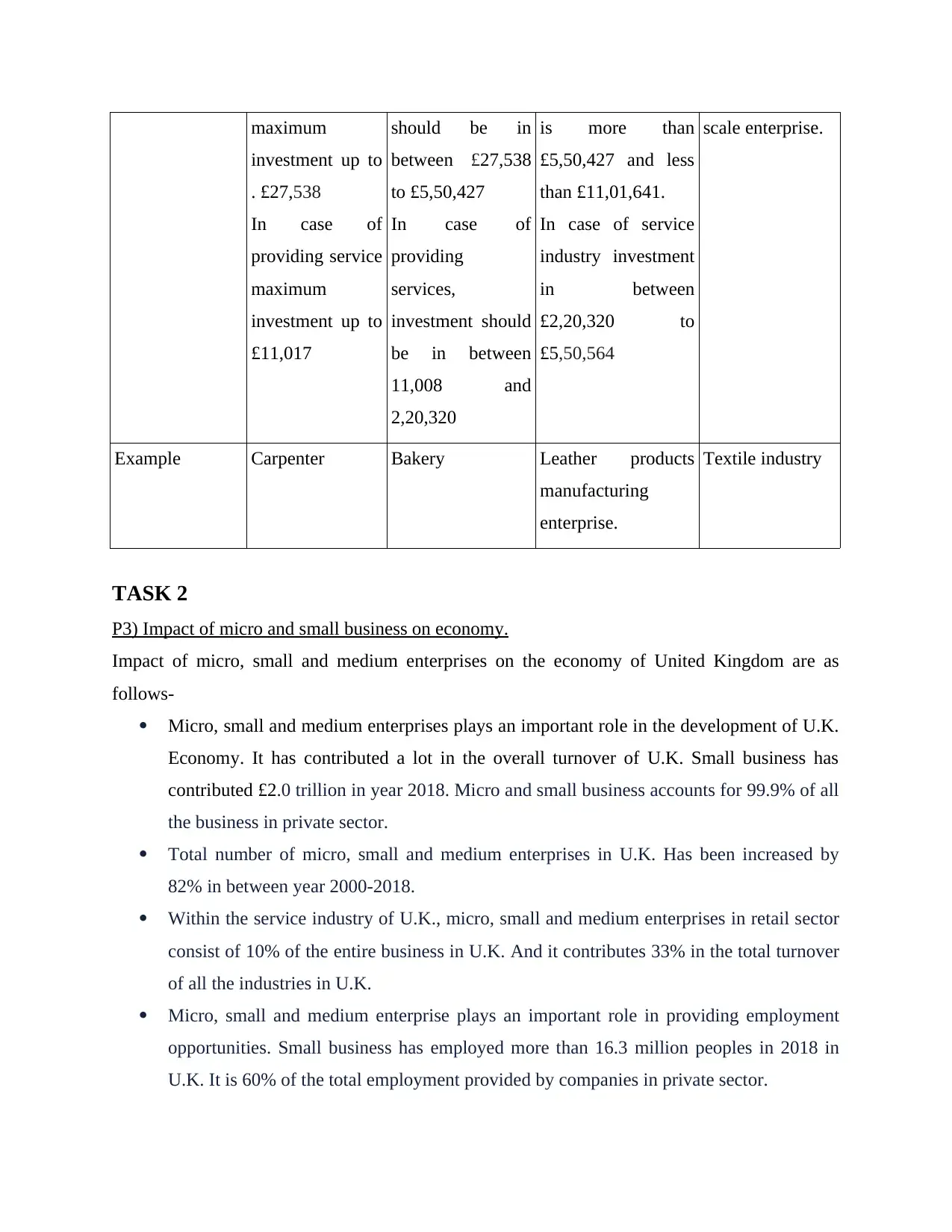
maximum
investment up to
. £27,538
In case of
providing service
maximum
investment up to
£11,017
should be in
between £27,538
to £5,50,427
In case of
providing
services,
investment should
be in between
11,008 and
2,20,320
is more than
£5,50,427 and less
than £11,01,641.
In case of service
industry investment
in between
£2,20,320 to
£5,50,564
scale enterprise.
Example Carpenter Bakery Leather products
manufacturing
enterprise.
Textile industry
TASK 2
P3) Impact of micro and small business on economy.
Impact of micro, small and medium enterprises on the economy of United Kingdom are as
follows-
Micro, small and medium enterprises plays an important role in the development of U.K.
Economy. It has contributed a lot in the overall turnover of U.K. Small business has
contributed £2.0 trillion in year 2018. Micro and small business accounts for 99.9% of all
the business in private sector.
Total number of micro, small and medium enterprises in U.K. Has been increased by
82% in between year 2000-2018.
Within the service industry of U.K., micro, small and medium enterprises in retail sector
consist of 10% of the entire business in U.K. And it contributes 33% in the total turnover
of all the industries in U.K.
Micro, small and medium enterprise plays an important role in providing employment
opportunities. Small business has employed more than 16.3 million peoples in 2018 in
U.K. It is 60% of the total employment provided by companies in private sector.
investment up to
. £27,538
In case of
providing service
maximum
investment up to
£11,017
should be in
between £27,538
to £5,50,427
In case of
providing
services,
investment should
be in between
11,008 and
2,20,320
is more than
£5,50,427 and less
than £11,01,641.
In case of service
industry investment
in between
£2,20,320 to
£5,50,564
scale enterprise.
Example Carpenter Bakery Leather products
manufacturing
enterprise.
Textile industry
TASK 2
P3) Impact of micro and small business on economy.
Impact of micro, small and medium enterprises on the economy of United Kingdom are as
follows-
Micro, small and medium enterprises plays an important role in the development of U.K.
Economy. It has contributed a lot in the overall turnover of U.K. Small business has
contributed £2.0 trillion in year 2018. Micro and small business accounts for 99.9% of all
the business in private sector.
Total number of micro, small and medium enterprises in U.K. Has been increased by
82% in between year 2000-2018.
Within the service industry of U.K., micro, small and medium enterprises in retail sector
consist of 10% of the entire business in U.K. And it contributes 33% in the total turnover
of all the industries in U.K.
Micro, small and medium enterprise plays an important role in providing employment
opportunities. Small business has employed more than 16.3 million peoples in 2018 in
U.K. It is 60% of the total employment provided by companies in private sector.
⊘ This is a preview!⊘
Do you want full access?
Subscribe today to unlock all pages.

Trusted by 1+ million students worldwide
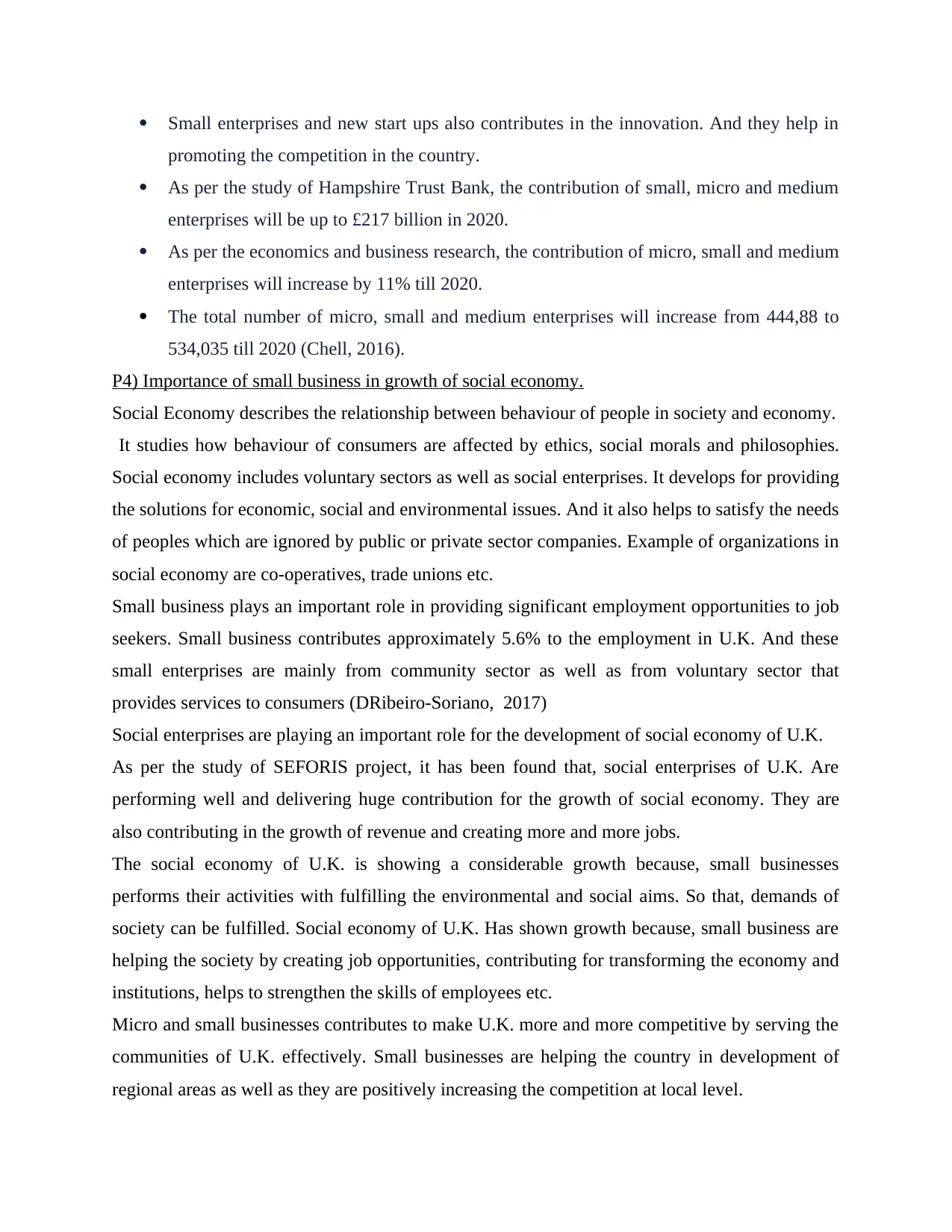
Small enterprises and new start ups also contributes in the innovation. And they help in
promoting the competition in the country.
As per the study of Hampshire Trust Bank, the contribution of small, micro and medium
enterprises will be up to £217 billion in 2020.
As per the economics and business research, the contribution of micro, small and medium
enterprises will increase by 11% till 2020.
The total number of micro, small and medium enterprises will increase from 444,88 to
534,035 till 2020 (Chell, 2016).
P4) Importance of small business in growth of social economy.
Social Economy describes the relationship between behaviour of people in society and economy.
It studies how behaviour of consumers are affected by ethics, social morals and philosophies.
Social economy includes voluntary sectors as well as social enterprises. It develops for providing
the solutions for economic, social and environmental issues. And it also helps to satisfy the needs
of peoples which are ignored by public or private sector companies. Example of organizations in
social economy are co-operatives, trade unions etc.
Small business plays an important role in providing significant employment opportunities to job
seekers. Small business contributes approximately 5.6% to the employment in U.K. And these
small enterprises are mainly from community sector as well as from voluntary sector that
provides services to consumers (DRibeiro-Soriano, 2017)
Social enterprises are playing an important role for the development of social economy of U.K.
As per the study of SEFORIS project, it has been found that, social enterprises of U.K. Are
performing well and delivering huge contribution for the growth of social economy. They are
also contributing in the growth of revenue and creating more and more jobs.
The social economy of U.K. is showing a considerable growth because, small businesses
performs their activities with fulfilling the environmental and social aims. So that, demands of
society can be fulfilled. Social economy of U.K. Has shown growth because, small business are
helping the society by creating job opportunities, contributing for transforming the economy and
institutions, helps to strengthen the skills of employees etc.
Micro and small businesses contributes to make U.K. more and more competitive by serving the
communities of U.K. effectively. Small businesses are helping the country in development of
regional areas as well as they are positively increasing the competition at local level.
promoting the competition in the country.
As per the study of Hampshire Trust Bank, the contribution of small, micro and medium
enterprises will be up to £217 billion in 2020.
As per the economics and business research, the contribution of micro, small and medium
enterprises will increase by 11% till 2020.
The total number of micro, small and medium enterprises will increase from 444,88 to
534,035 till 2020 (Chell, 2016).
P4) Importance of small business in growth of social economy.
Social Economy describes the relationship between behaviour of people in society and economy.
It studies how behaviour of consumers are affected by ethics, social morals and philosophies.
Social economy includes voluntary sectors as well as social enterprises. It develops for providing
the solutions for economic, social and environmental issues. And it also helps to satisfy the needs
of peoples which are ignored by public or private sector companies. Example of organizations in
social economy are co-operatives, trade unions etc.
Small business plays an important role in providing significant employment opportunities to job
seekers. Small business contributes approximately 5.6% to the employment in U.K. And these
small enterprises are mainly from community sector as well as from voluntary sector that
provides services to consumers (DRibeiro-Soriano, 2017)
Social enterprises are playing an important role for the development of social economy of U.K.
As per the study of SEFORIS project, it has been found that, social enterprises of U.K. Are
performing well and delivering huge contribution for the growth of social economy. They are
also contributing in the growth of revenue and creating more and more jobs.
The social economy of U.K. is showing a considerable growth because, small businesses
performs their activities with fulfilling the environmental and social aims. So that, demands of
society can be fulfilled. Social economy of U.K. Has shown growth because, small business are
helping the society by creating job opportunities, contributing for transforming the economy and
institutions, helps to strengthen the skills of employees etc.
Micro and small businesses contributes to make U.K. more and more competitive by serving the
communities of U.K. effectively. Small businesses are helping the country in development of
regional areas as well as they are positively increasing the competition at local level.
Paraphrase This Document
Need a fresh take? Get an instant paraphrase of this document with our AI Paraphraser
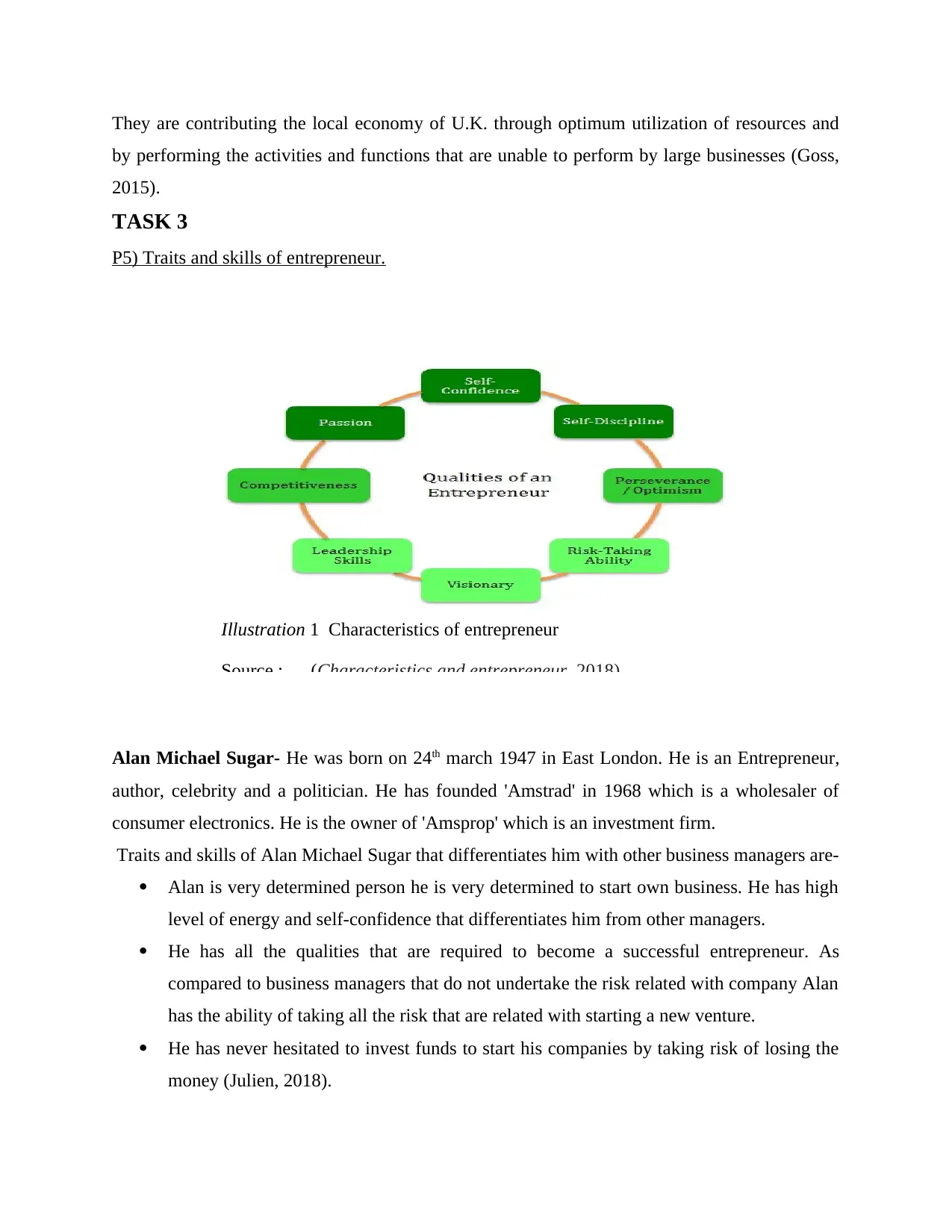
They are contributing the local economy of U.K. through optimum utilization of resources and
by performing the activities and functions that are unable to perform by large businesses (Goss,
2015).
TASK 3
P5) Traits and skills of entrepreneur.
Alan Michael Sugar- He was born on 24th march 1947 in East London. He is an Entrepreneur,
author, celebrity and a politician. He has founded 'Amstrad' in 1968 which is a wholesaler of
consumer electronics. He is the owner of 'Amsprop' which is an investment firm.
Traits and skills of Alan Michael Sugar that differentiates him with other business managers are-
Alan is very determined person he is very determined to start own business. He has high
level of energy and self-confidence that differentiates him from other managers.
He has all the qualities that are required to become a successful entrepreneur. As
compared to business managers that do not undertake the risk related with company Alan
has the ability of taking all the risk that are related with starting a new venture.
He has never hesitated to invest funds to start his companies by taking risk of losing the
money (Julien, 2018).
Illustration 1 Characteristics of entrepreneur
Source : (Characteristics and entrepreneur. 2018)
by performing the activities and functions that are unable to perform by large businesses (Goss,
2015).
TASK 3
P5) Traits and skills of entrepreneur.
Alan Michael Sugar- He was born on 24th march 1947 in East London. He is an Entrepreneur,
author, celebrity and a politician. He has founded 'Amstrad' in 1968 which is a wholesaler of
consumer electronics. He is the owner of 'Amsprop' which is an investment firm.
Traits and skills of Alan Michael Sugar that differentiates him with other business managers are-
Alan is very determined person he is very determined to start own business. He has high
level of energy and self-confidence that differentiates him from other managers.
He has all the qualities that are required to become a successful entrepreneur. As
compared to business managers that do not undertake the risk related with company Alan
has the ability of taking all the risk that are related with starting a new venture.
He has never hesitated to invest funds to start his companies by taking risk of losing the
money (Julien, 2018).
Illustration 1 Characteristics of entrepreneur
Source : (Characteristics and entrepreneur. 2018)
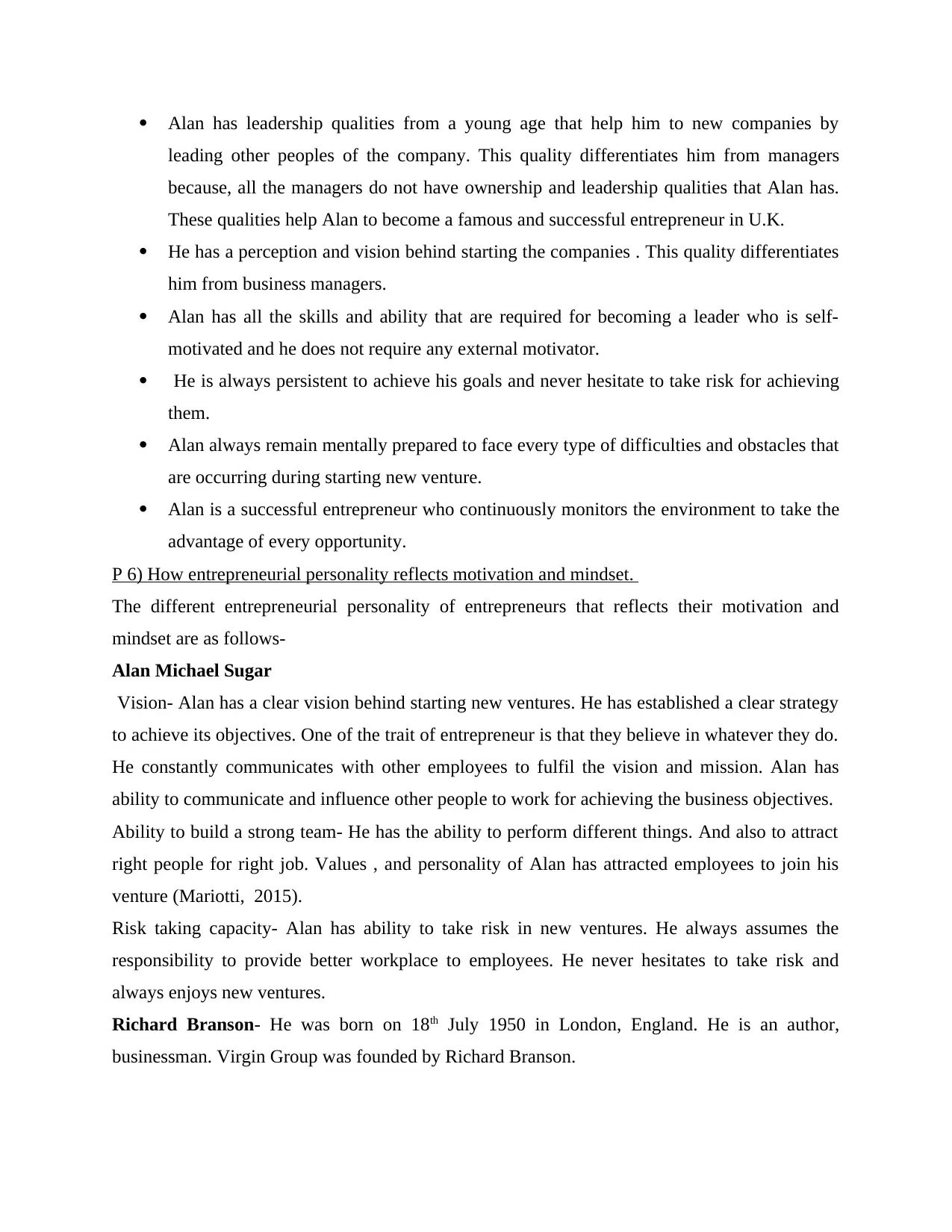
Alan has leadership qualities from a young age that help him to new companies by
leading other peoples of the company. This quality differentiates him from managers
because, all the managers do not have ownership and leadership qualities that Alan has.
These qualities help Alan to become a famous and successful entrepreneur in U.K.
He has a perception and vision behind starting the companies . This quality differentiates
him from business managers.
Alan has all the skills and ability that are required for becoming a leader who is self-
motivated and he does not require any external motivator.
He is always persistent to achieve his goals and never hesitate to take risk for achieving
them.
Alan always remain mentally prepared to face every type of difficulties and obstacles that
are occurring during starting new venture.
Alan is a successful entrepreneur who continuously monitors the environment to take the
advantage of every opportunity.
P 6) How entrepreneurial personality reflects motivation and mindset.
The different entrepreneurial personality of entrepreneurs that reflects their motivation and
mindset are as follows-
Alan Michael Sugar
Vision- Alan has a clear vision behind starting new ventures. He has established a clear strategy
to achieve its objectives. One of the trait of entrepreneur is that they believe in whatever they do.
He constantly communicates with other employees to fulfil the vision and mission. Alan has
ability to communicate and influence other people to work for achieving the business objectives.
Ability to build a strong team- He has the ability to perform different things. And also to attract
right people for right job. Values , and personality of Alan has attracted employees to join his
venture (Mariotti, 2015).
Risk taking capacity- Alan has ability to take risk in new ventures. He always assumes the
responsibility to provide better workplace to employees. He never hesitates to take risk and
always enjoys new ventures.
Richard Branson- He was born on 18th July 1950 in London, England. He is an author,
businessman. Virgin Group was founded by Richard Branson.
leading other peoples of the company. This quality differentiates him from managers
because, all the managers do not have ownership and leadership qualities that Alan has.
These qualities help Alan to become a famous and successful entrepreneur in U.K.
He has a perception and vision behind starting the companies . This quality differentiates
him from business managers.
Alan has all the skills and ability that are required for becoming a leader who is self-
motivated and he does not require any external motivator.
He is always persistent to achieve his goals and never hesitate to take risk for achieving
them.
Alan always remain mentally prepared to face every type of difficulties and obstacles that
are occurring during starting new venture.
Alan is a successful entrepreneur who continuously monitors the environment to take the
advantage of every opportunity.
P 6) How entrepreneurial personality reflects motivation and mindset.
The different entrepreneurial personality of entrepreneurs that reflects their motivation and
mindset are as follows-
Alan Michael Sugar
Vision- Alan has a clear vision behind starting new ventures. He has established a clear strategy
to achieve its objectives. One of the trait of entrepreneur is that they believe in whatever they do.
He constantly communicates with other employees to fulfil the vision and mission. Alan has
ability to communicate and influence other people to work for achieving the business objectives.
Ability to build a strong team- He has the ability to perform different things. And also to attract
right people for right job. Values , and personality of Alan has attracted employees to join his
venture (Mariotti, 2015).
Risk taking capacity- Alan has ability to take risk in new ventures. He always assumes the
responsibility to provide better workplace to employees. He never hesitates to take risk and
always enjoys new ventures.
Richard Branson- He was born on 18th July 1950 in London, England. He is an author,
businessman. Virgin Group was founded by Richard Branson.
⊘ This is a preview!⊘
Do you want full access?
Subscribe today to unlock all pages.

Trusted by 1+ million students worldwide
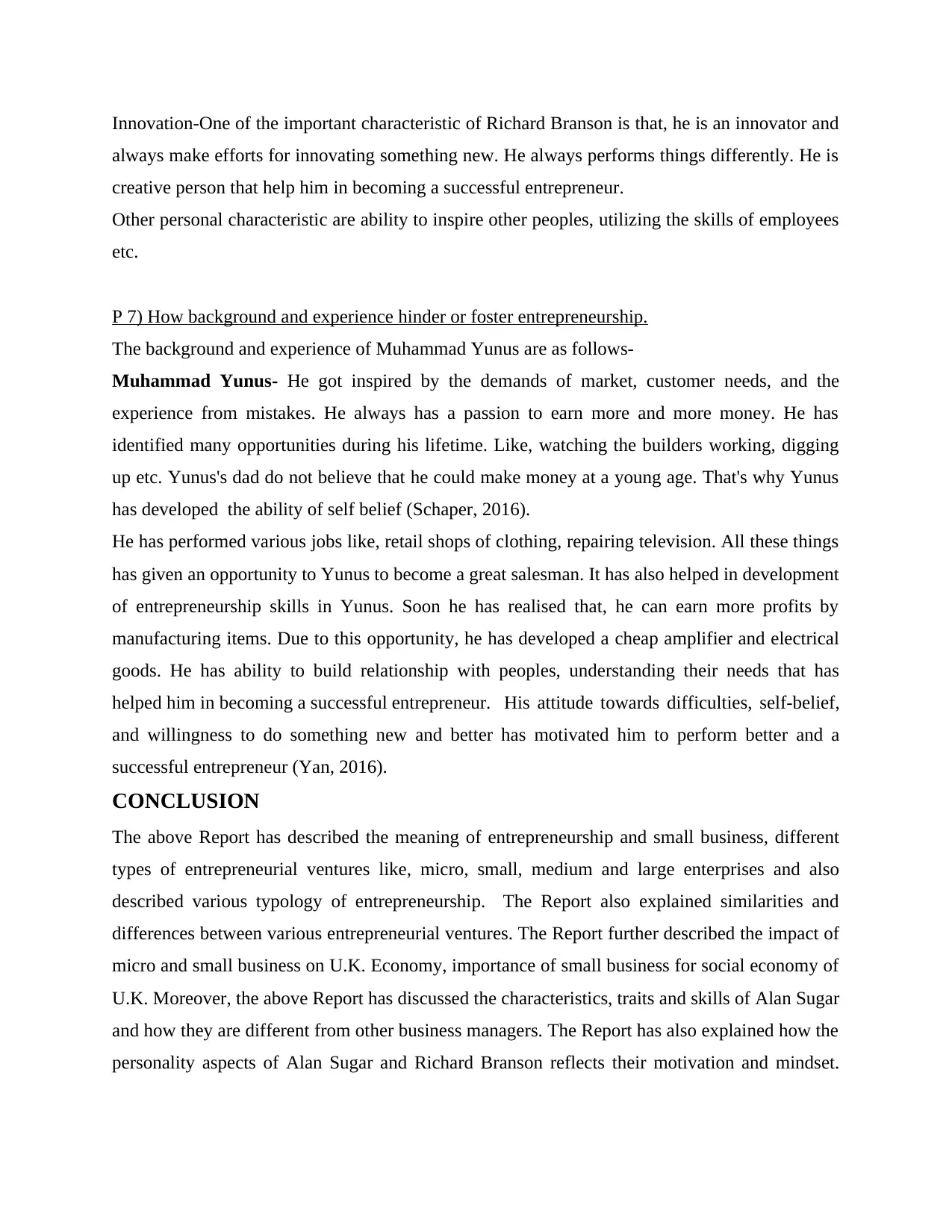
Innovation-One of the important characteristic of Richard Branson is that, he is an innovator and
always make efforts for innovating something new. He always performs things differently. He is
creative person that help him in becoming a successful entrepreneur.
Other personal characteristic are ability to inspire other peoples, utilizing the skills of employees
etc.
P 7) How background and experience hinder or foster entrepreneurship.
The background and experience of Muhammad Yunus are as follows-
Muhammad Yunus- He got inspired by the demands of market, customer needs, and the
experience from mistakes. He always has a passion to earn more and more money. He has
identified many opportunities during his lifetime. Like, watching the builders working, digging
up etc. Yunus's dad do not believe that he could make money at a young age. That's why Yunus
has developed the ability of self belief (Schaper, 2016).
He has performed various jobs like, retail shops of clothing, repairing television. All these things
has given an opportunity to Yunus to become a great salesman. It has also helped in development
of entrepreneurship skills in Yunus. Soon he has realised that, he can earn more profits by
manufacturing items. Due to this opportunity, he has developed a cheap amplifier and electrical
goods. He has ability to build relationship with peoples, understanding their needs that has
helped him in becoming a successful entrepreneur. His attitude towards difficulties, self-belief,
and willingness to do something new and better has motivated him to perform better and a
successful entrepreneur (Yan, 2016).
CONCLUSION
The above Report has described the meaning of entrepreneurship and small business, different
types of entrepreneurial ventures like, micro, small, medium and large enterprises and also
described various typology of entrepreneurship. The Report also explained similarities and
differences between various entrepreneurial ventures. The Report further described the impact of
micro and small business on U.K. Economy, importance of small business for social economy of
U.K. Moreover, the above Report has discussed the characteristics, traits and skills of Alan Sugar
and how they are different from other business managers. The Report has also explained how the
personality aspects of Alan Sugar and Richard Branson reflects their motivation and mindset.
always make efforts for innovating something new. He always performs things differently. He is
creative person that help him in becoming a successful entrepreneur.
Other personal characteristic are ability to inspire other peoples, utilizing the skills of employees
etc.
P 7) How background and experience hinder or foster entrepreneurship.
The background and experience of Muhammad Yunus are as follows-
Muhammad Yunus- He got inspired by the demands of market, customer needs, and the
experience from mistakes. He always has a passion to earn more and more money. He has
identified many opportunities during his lifetime. Like, watching the builders working, digging
up etc. Yunus's dad do not believe that he could make money at a young age. That's why Yunus
has developed the ability of self belief (Schaper, 2016).
He has performed various jobs like, retail shops of clothing, repairing television. All these things
has given an opportunity to Yunus to become a great salesman. It has also helped in development
of entrepreneurship skills in Yunus. Soon he has realised that, he can earn more profits by
manufacturing items. Due to this opportunity, he has developed a cheap amplifier and electrical
goods. He has ability to build relationship with peoples, understanding their needs that has
helped him in becoming a successful entrepreneur. His attitude towards difficulties, self-belief,
and willingness to do something new and better has motivated him to perform better and a
successful entrepreneur (Yan, 2016).
CONCLUSION
The above Report has described the meaning of entrepreneurship and small business, different
types of entrepreneurial ventures like, micro, small, medium and large enterprises and also
described various typology of entrepreneurship. The Report also explained similarities and
differences between various entrepreneurial ventures. The Report further described the impact of
micro and small business on U.K. Economy, importance of small business for social economy of
U.K. Moreover, the above Report has discussed the characteristics, traits and skills of Alan Sugar
and how they are different from other business managers. The Report has also explained how the
personality aspects of Alan Sugar and Richard Branson reflects their motivation and mindset.
Paraphrase This Document
Need a fresh take? Get an instant paraphrase of this document with our AI Paraphraser
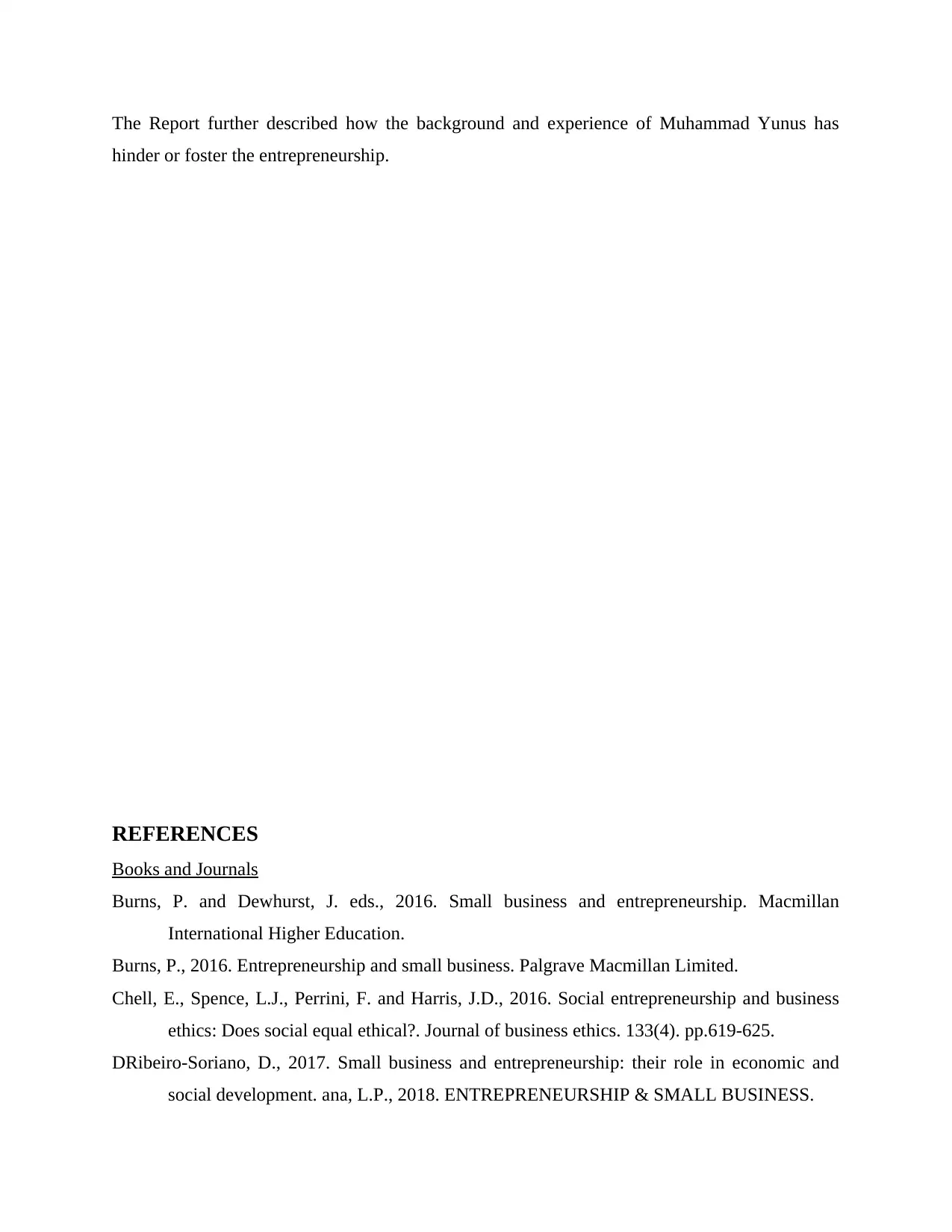
The Report further described how the background and experience of Muhammad Yunus has
hinder or foster the entrepreneurship.
REFERENCES
Books and Journals
Burns, P. and Dewhurst, J. eds., 2016. Small business and entrepreneurship. Macmillan
International Higher Education.
Burns, P., 2016. Entrepreneurship and small business. Palgrave Macmillan Limited.
Chell, E., Spence, L.J., Perrini, F. and Harris, J.D., 2016. Social entrepreneurship and business
ethics: Does social equal ethical?. Journal of business ethics. 133(4). pp.619-625.
DRibeiro-Soriano, D., 2017. Small business and entrepreneurship: their role in economic and
social development. ana, L.P., 2018. ENTREPRENEURSHIP & SMALL BUSINESS.
hinder or foster the entrepreneurship.
REFERENCES
Books and Journals
Burns, P. and Dewhurst, J. eds., 2016. Small business and entrepreneurship. Macmillan
International Higher Education.
Burns, P., 2016. Entrepreneurship and small business. Palgrave Macmillan Limited.
Chell, E., Spence, L.J., Perrini, F. and Harris, J.D., 2016. Social entrepreneurship and business
ethics: Does social equal ethical?. Journal of business ethics. 133(4). pp.619-625.
DRibeiro-Soriano, D., 2017. Small business and entrepreneurship: their role in economic and
social development. ana, L.P., 2018. ENTREPRENEURSHIP & SMALL BUSINESS.
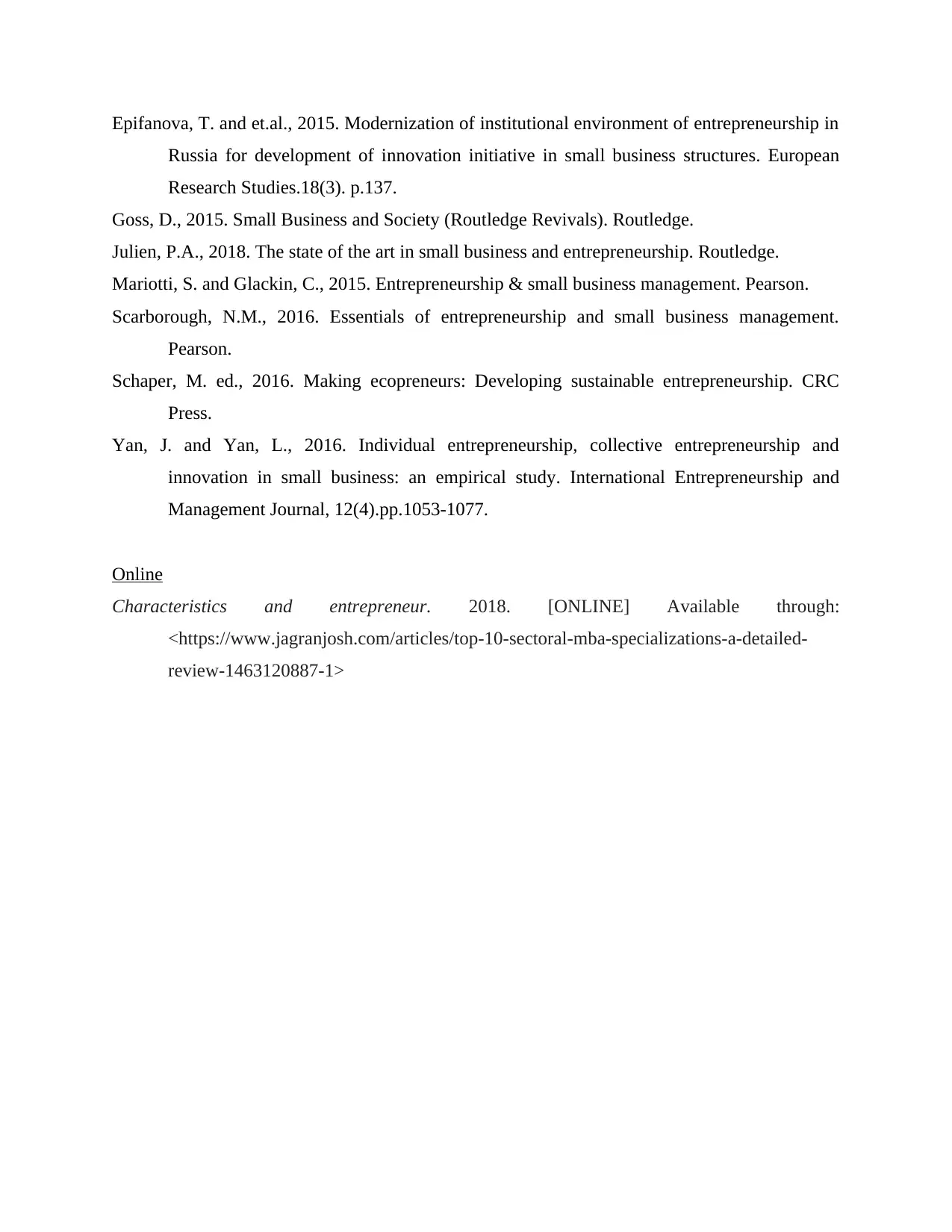
Epifanova, T. and et.al., 2015. Modernization of institutional environment of entrepreneurship in
Russia for development of innovation initiative in small business structures. European
Research Studies.18(3). p.137.
Goss, D., 2015. Small Business and Society (Routledge Revivals). Routledge.
Julien, P.A., 2018. The state of the art in small business and entrepreneurship. Routledge.
Mariotti, S. and Glackin, C., 2015. Entrepreneurship & small business management. Pearson.
Scarborough, N.M., 2016. Essentials of entrepreneurship and small business management.
Pearson.
Schaper, M. ed., 2016. Making ecopreneurs: Developing sustainable entrepreneurship. CRC
Press.
Yan, J. and Yan, L., 2016. Individual entrepreneurship, collective entrepreneurship and
innovation in small business: an empirical study. International Entrepreneurship and
Management Journal, 12(4).pp.1053-1077.
Online
Characteristics and entrepreneur. 2018. [ONLINE] Available through:
<https://www.jagranjosh.com/articles/top-10-sectoral-mba-specializations-a-detailed-
review-1463120887-1>
Russia for development of innovation initiative in small business structures. European
Research Studies.18(3). p.137.
Goss, D., 2015. Small Business and Society (Routledge Revivals). Routledge.
Julien, P.A., 2018. The state of the art in small business and entrepreneurship. Routledge.
Mariotti, S. and Glackin, C., 2015. Entrepreneurship & small business management. Pearson.
Scarborough, N.M., 2016. Essentials of entrepreneurship and small business management.
Pearson.
Schaper, M. ed., 2016. Making ecopreneurs: Developing sustainable entrepreneurship. CRC
Press.
Yan, J. and Yan, L., 2016. Individual entrepreneurship, collective entrepreneurship and
innovation in small business: an empirical study. International Entrepreneurship and
Management Journal, 12(4).pp.1053-1077.
Online
Characteristics and entrepreneur. 2018. [ONLINE] Available through:
<https://www.jagranjosh.com/articles/top-10-sectoral-mba-specializations-a-detailed-
review-1463120887-1>
⊘ This is a preview!⊘
Do you want full access?
Subscribe today to unlock all pages.

Trusted by 1+ million students worldwide
1 out of 12
Related Documents
Your All-in-One AI-Powered Toolkit for Academic Success.
+13062052269
info@desklib.com
Available 24*7 on WhatsApp / Email
![[object Object]](/_next/static/media/star-bottom.7253800d.svg)
Unlock your academic potential
Copyright © 2020–2025 A2Z Services. All Rights Reserved. Developed and managed by ZUCOL.





